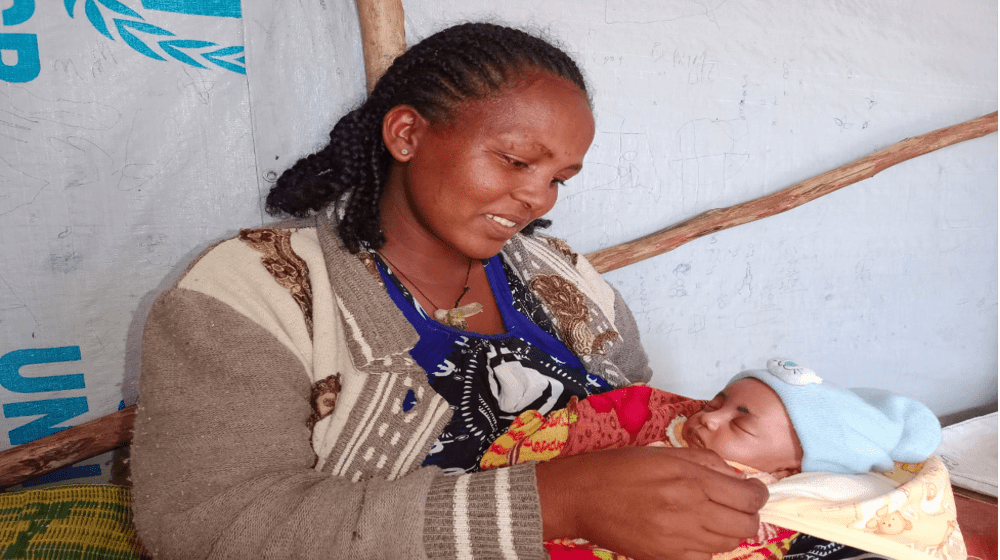MEKELLE, Tigray - “I have survived my pregnancy on hardly one meal a day. Now, I am concerned about my baby’s health as we are living on minimum food in the camp”, says Daniet, during her regular postnatal care check-up at the maternity clinic in Sabacare 4, an internally displaced person (IDP) camp on the outskirts of Mekelle, Tigray Region.
Daniet fled western Tigray with four of her seven children in early April 2021, when conflict intensified across the region, displacing millions of people and leaving more than 5.2 million in need of urgent humanitarian assistance. Since then, and without any source of income, her family has relied entirely on aid. The reality for pregnant women like Daniet in Tigray is harsh; malnutrition rates among pregnant and lactating women are alarmingly high in the region.
Trying to survive
After 18 months of fighting, many people are facing hunger in Tigray, including health care providers who have remained unpaid for 10 months while the cost of living has soared.
“Health professionals have not received a salary since July. Many are now discontinuing work and looking for alternative ways to feed their families. The situation is dire, without access to life-saving services many pregnant women are facing great risks”, a health professional from Shire district, Tigray, who did not want to reveal her identity, told UNFPA.
In addition to a shortage of providers, damage and destruction to health facilities and a lack of life-saving medical supplies are severely disrupting the delivery of sexual and reproductive health services. The availability of maternal health care, including emergency obstetric care to treat life-threatening pregnancy complications, has also been critically compromised. Nearly 118,000 women are estimated to be pregnant in the region with 5,800 women expected to experience an obstetric complication in the next three months.
Despite the recent positive announcement of a humanitarian truce, aid supplies, including food and essential health supplies, are trickling into Tigray and are insufficient to meet needs on-the-ground. Daniet prays her newborn doesn’t get sick. “Life is not granted in these conditions”, she says wearily.
Maintaining care for pregnant women
Amid growing needs and challenges for the delivery of reproductive health care, Maedot – a community-based health organization supported by UNFPA – has been providing much-needed maternal and newborn health services at its Maternity Waiting Home in Sabacare 4 IDP camp. UNFPA has supported Maedot with reproductive health supplies, including medicines for the management of obstetric emergencies, but these are already running low or out of stock altogether.
“It’s not easy,” says Rahwa G., a nurse at the clinic. “We don’t have all the equipment and medications we need. UNFPA provided us with supplies for the provision of maternal care and reproductive services, but some medications - including oxytocin and contraceptives - have already run out.”
Daniet feels grateful to Maedot, who supported her with postnatal care, but is aware that she is lucky. “I have survived this time, but if other pregnant women have a complication what will be the consequences? They all know about the lack of medicines in all health centres,” she says.
Prioritizing essential health services
In March 2022, UNFPA delivered 5 metric tonnes of reproductive health supplies, medicines and equipment to more than 40 health facilities in Tigray and plans to deliver an additional 8 tons in the coming weeks. Skilled birth attendants and health extension workers have also been deployed to improve the quality of maternal and reproductive health services, providing around 73,000 antenatal, delivery and postnatal consultations across the region.
To continue providing life-saving services, including maternal and newborn health and protection services, UNFPA is appealing for $24 million as part of the broader 2022 UN Humanitarian Appeal for Ethiopia. To date, there is a critical funding gap of US $11 million.


